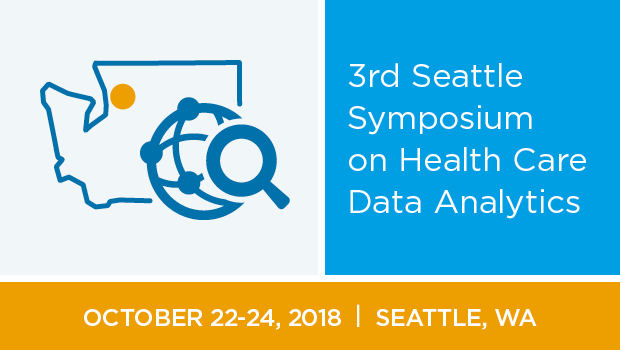Seattle Symposium: Solving health data challenges with statistics

Interested in using data and innovative methods to improve everyday care? Join our October conference.
Around the world, health care systems are moving from paper to electronic health records (EHRs) to manage patient information. To track our own health, many of us are using fitness trackers, smartphone health apps, and online diet or exercise diaries. These digital tools create massive, diverse data resources on clinical practices, patient outcomes, and individual health.
This October 22–24, experts in health data and biostatistics will talk about transforming clinical care using data from EHRs, personal health trackers, social media, and more at the 3rd Seattle Symposium on Health Care Data Analytics. One of the symposium organizers, Kaiser Permanente Washington Health Research Institute (KPWHRI) Assistant Investigator Yates Coley, PhD, answered questions about what attendees can expect.
The KPWHRI Biostatistics Unit and the University of Washington Department of Biostatistics organized similar symposia in 2014 and 2016. What are the goals of these meetings?
Yates: We hear a lot about the promise of using big data in learning health systems to inform care and deliver precision medicine. Evidence shows that data can help patients and providers make smarter clinical decisions. But we don’t always know how to go from ideas to real-life clinical solutions. How do we actually make these improvements in care happen? Using health data to change care has a lot of challenges.
The Seattle Symposia bring together people with diverse expertise — biostatisticians, health services researchers, data scientists, and health system leaders — to talk about how rigorous statistical methods can overcome health data limitations so we can draw meaningful conclusions from them.
What’s on the agenda this year?
Yates: We’ll be discussing big ideas about precision medicine and learning health systems but we’ll also get down to brass tacks and talk about how biostatisticians and health researchers work with and apply health data in clinical research and practice. We have talks from people who have used data to change care at places like Kaiser Permanente, Johns Hopkins University Hospital, and the University of Washington. We are also excited to be bringing together experts from academic medical centers, research institutions like KPWHRI, and tech companies like Flatiron Health to share knowledge on how to best learn from health data.
We’ve posted a preliminary program and I can give a few examples:
• Scott Zeger from Johns Hopkins Bloomberg School of Public Health and Lucy Savitz from Kaiser Permanente will talk about using data generated in clinical care to learn about the most effective ways to prevent and treat disease and the most efficient and lasting ways to implement best practices into clinical care. Patrick Heagerty, symposium co-organizer and chair of the University of Washington (UW) Biostatistics Department, will lead a discussion on how biostatisticians can contribute to delivering data-driven health care.
• Vincent Liu from Kaiser Permanente and Su-In Lee from UW will talk about shepherding a project from development and validation of a prediction model to getting the model into everyday clinical practice.
• We have an entire session on leveraging big data to address the opioid epidemic. Our speakers are Tamra Meyer, U.S. Food and Drug Administration, Daniel Neill, New York University, and Kaiser Permanente health researchers. They’ll talk about surveillance of opioid use, misuse, and overdoses to understand the scope of the crisis and developing interventions for patients and primary care teams to ease the problem at the clinic level.
• One session covers health-related data that’s not in EHRs. Scott Counts from Microsoft Research will talk about social media data and Ross Prentice from Fred Hutchinson Cancer Research Center and UW will talk about nutrition data sources such as food diaries. Vadim Zipunnikov (Johns Hopkins) will describe how to use data from wearable physical activity monitors and Krisda Chaiyachati (University of Pennsylvania) will speak on social determinants of health.
• We’re excited to add a session to this year’s symposium on how EHR data can also inform health policy. Ruth Etzioni, Fred Hutch, will speak on combining health registry and clinical trial data to improve cancer screening and Sherri Rose, Harvard Medical School, will discuss machine learning methods with applications to health insurance claims data.
What can participants get at this symposium that is different from other conferences?
Yates: This meeting is limited to under 200 people. Everyone will be in the same room, hearing the same talks, so it will be one big discussion. We’ll have lots of time to ask questions, discuss ideas, and share strategies.
Plus, we have two short courses on the first day on targeted learning methods, including statistical packages to use, and effective data visualization.
How can people sign up or learn more?
Yates: Our website has information and a registration link. Email SeattleSymposium@kp.org and co-organizer Andrea Cook and I will answer. Please join us in October!
Learn more about Kaiser Permanente Washington Health Research Institute. Sign up for our free monthly newsletter.


